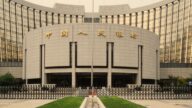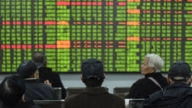【新唐人2014年01月25日讯】大陆央行21号破天荒的注入资金3700多亿元人民币,引起了国际舆论对中国“钱荒”的高度关注。北京《国情内参》期刊首席研究员巩胜利,和美国“纽约城市大学”经济学教授陈志飞博士,为观众解读中国发生“钱荒”的原因。下面请看本台记者唐音的采访报导。
21号,央行开展了“2550亿逆回购”,其中750亿7天逆回购,1800亿21天逆回购。创下了约11个月来的新高。而20号,央行已经通过常备借贷便利(SLF),向大型商业银行提供短期流动性资金,总计1200亿元人民币。
“逆回购”是指央行向一级交易商购买有价证券,向市场注资增加货币的供应量。
央行的这些前所未有的大动作,引起了世界媒体如美国《华尔街日报》、和“美国有线电视《CNN》”对中国“钱荒”的关注。
北京《国情内参》期刊首席研究员巩胜利分析,央行巨额资金注入以防“钱荒”,和国际上美国加速收回美元有关。
巩胜利:“美国的宽松货币政策已经大规模的收缩了,那美元一收回,货币市场就没钱用了,市场上那要其他货币来填进去,影响最大的可能就是中国。昨天是很吓人的, 在中国的历史上从来没有的,被《路透社》称作是‘血雨腥风’的一天。”
美国纽约城市大学经济学教授陈志飞博士分析,美国的经济基本已经走出低谷,所以美国联邦储备银行决定取消宽松政策。而美国一收回美元,很可能造成人民币汇率走低。
20号,上海银行间同业拆放利率(Shanghai Interbank Offered Rate,Shibor)近乎普遍上涨,业界一片惊呼:大陆“钱荒”有卷土重来之势。
而股市由于货币市场利率的上升遭到重创。上证指数跌破2000点大关,创下近6个月来的最低水平。
央行的“逆回购”消息一出,令银行间市场相当兴奋,银行间7天回购利率21号下跌到5.5%,比20号的7.5%有显着下降。大陆的货币市场利率也迅速恢复平稳。
美国纽约城市大学经济学教授陈志飞:“央行现在主要是解燃眉之急,它并没有一个具体的策略,要长期的对市场、对经济进行宽松。这说明中国的经济是非常脆弱的,央行也知道它没法长期承担那麽大的风险,只能是短线的、杯水车薪的方式。”
对于这次大规模注入资金,官方声称是为加强银行体系的流动性。“北京大学光华管理学院金融与证券研究中心”主任曹凤岐向媒体指出,从现实需求来看,货币不发会出现“钱荒”。而大规模的发货币,只能说明资金的利用效率越来越差。
业内人士估计,21天逆回购跨越中国新年,可以充足保证过年前的资金供应,对于“钱荒”的忧虑可以暂歇。但“逆回购”在中国新年后一到期,仍面临资金回笼的可能性,并不代表货币政策转向宽松。
陈志飞认为,不仅在中国新年后不容乐观,而且更大的忧虑来自中国经济的结构性问题。
陈志飞:“在经济危机之后,中央政府向民间撒放了大量的钱,那这个钱都被投放到了效益非常低的、回报是负值的房地产、基建项目上。因为这些债务现在到期了,这些基建项目效益不好,像高铁,这些都是赔钱的,那麽这些债务问题就造成了钱荒。而且借贷方主要是中央和地方各级政府。”
《CNN》电视台21号的报导说,分析家担忧,新的信贷不再产生强大的经济回报,不断膨胀的借贷,可能还会削弱经济增长。报导还说,央行周期性的允许利率大幅上升,之后再注入现金缓解信贷紧缩,是在危险的踩钢丝。
采访编辑/唐音 后制/葛雷
“Money Shortage” in China Leads to Worldwide Attention
Anchor: On Jan. 21, the mainland’s central bank injected an
unprecedented amount of funding
with more than 370 billion RMB.
This action attracted international media attention towards
China’s “money shortage”.
Hong Shengli, the lead researcher of Guo Qing Nei Can journal
in Beijing, and Dr. Chen Zhifei, a professor of economics at
the City University of New York, will explain the reasons
for the shortage of money.
Please watch the report from NTD TV reporter Tang Yin.
Reporter: On Jan. 21, the Central Bank launched the “255
billion yuan ($42 billion) reverse repurchase agreements”,
including 75 billion 7 day reverse repurchase agreements and
180 billion 21 day reverse repurchase agreements, which hit
a new high position within around 11 months.
Until Jan. 20, the Central Bank had already provided
120 billion yuan in short-term liquidity to large commercial
banks by using the standing lending facility (SLF).
“Reverse Repurchase” agreements means the central bank
increased the supply of money to the market by buying
securities from primary dealers.
These unprecedented large actions from the central bank caused
media attention on China’s money shortage issue,
which included the Wall Street Journal and CNN.
Gong Shengli, the lead researcher of the Guo Qing Nei Can
journal in Beijing analyzed that the huge amounts of money
injected by the Central bank in China is related to the
accelerating recovery of the U.S. dollar in the United States.
The Central bank in China plans to prevent the money shortage.
Gong Shengli: There is a massive contraction on the loose
monetary policy in USA.
If the dollar were to recover, there wouldn’t be enough money
in the money market.
China will be greatly affected as other currencies on the
market may fill in.
Dr. Chen Zhifei, the professor of economics at the
City University of New York analyzed that the U.S. economy
has bottomed out.
Therefore, the United States Federal Reserve Bank decided to
cancel the loose monetary policy.
If the U.S. dollar has recovered, the RMB exchange rate
could be lowering.
On Jan. 20, the Shanghai Interbank Offered Rate
(Shibor) rose universally.
The industry exclaimed, “money shortage has come back”.
The stock market was hit due to the rise in market rates.
The Shanghai Composite Index fell below the 2,000 points mark,
which is its lowest level in nearly six months.
After the reverse repos news came out, the inter-bank
market got quite excited.
The interbank seven-day repo rate fell to 5.5% on Jan. 21,
which is a significant decline by comparing it with the 7.5%
drop on Jan. 20.
The money market rates have stabilized quickly.
Chen Zhifei: The central bank has focused on
the main urgent needs.
There is no specific strategy for long-term markets,
including easing the economy.
It shows that China’s economy is very fragile.
The central bank also knows that it can not bear such
a long-term risk.
The only way is to provide short-term support.
For this massive injection of funds, the official claims is, that
the target is to strengthen the liquidity of
the banking system.
Cao Fengqi, the director of the Finance and Securities
Research Center of Guanghua School of Management at
Peking University, pointed out that according to a practical
demands, the money shortage could happen without
the massive currency.
The massive currency issued shows the efficiency of capital
utilization is getting worse.
The industry insiders estimate that 21 day reverse repos
stretch across the Chinese New Year, which could be sufficient
to ensure the supply of funds over the year and pause
the money shortage worries.
However, the reverse repos will expire after
the Chinese New Year.
There is still a possibility of capital return.
It does not mean that loose monetary policy
will be shifted.
Chen Zhifei believed that it is not optimistic with the
situation after the Chinese New Year.
Besides, there could be bigger worries according to
China’s economic structural problems.
Chen Zhifei: After the economic crisis, the central
government provided a lot of money, which has been invested
in real estate and infrastructure projects with very low
or negative returns.
These debts are going to expire and these infrastructure
projects, such as high-speed railway, are losing money.
Then these debt problems caused a shortage of money.
The lenders are mainly the central and local governments.
According to the report from CNN TV on Jan. 21, analysts are
worried that the new credit may no longer generate
strong economic returns.
The ballooning of borrowing may also
undermine economic growth.
The reports also mentioned that the central bank allows a
significant increase in interest rates periodically.
Then the next step will be the re-injection of cash to ease
the credit crunch.
It is a dangerous step along the wire.
Interview & Edit/TangYin Post-Production/Gelei

























